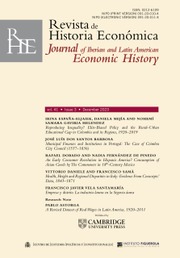No CrossRef data available.
Article contents
Comment on The economic consequences of empires (1492–1989)*
Published online by Cambridge University Press: 28 April 2010
Abstract
Patrick O'Brien and Leandro Prados de la Escosura say they are discussing «the economic consequences of empire», but in fact they are discussing «the costs and benefits of European imperialism». This is clearer and more specific, but I fear less useful. It is clearer, since «costs and benefits» are easier to quantify, and less useful in that I do not agree that «economic consequences» are the same as, or can be reduced to, an assessment of «costs and benefits». Furthermore, as they themselves note, «counterfactual assumptions are… implicit in any attempt… to measure costs and benefits of macro economic strategies» (O'Brien & Prados, 1998, p. 31), and I shall want to argue that what we need to do is make «factual assumptions».
- Type
- Notas
- Information
- Revista de Historia Economica - Journal of Iberian and Latin American Economic History , Volume 18 , Issue 2 , September 2000 , pp. 397 - 403
- Copyright
- Copyright © Instituto Figuerola de Historia y Ciencias Sociales, Universidad Carlos III de Madrid 2000
References
* Note of the Editor: This comment is referred to The Costs and Benefits of European Imperialism from the Conquest of Ceuta, 1415, to the Treaty of Lusaka, 1974, a volume of the Revista de Historia Económica, XVI, 1 (1998), edited by Patrick K. O'Brien and Leandro Prados de la Escosura.




